- Home
- Neal Asher
Total Conflict Page 7
Total Conflict Read online
Page 7
“And you?”
She gripped the wheel and flexed her shoulders. She was keeping to a steady 70 mph, staying inconspicuous.
“I’m not going to kill you,” she said. “You’re an idiot, but you’re also my cousin.”
“S-so, what are we going to do?”
She checked the mirror again. There were cars behind them but no sign they were being tailed.
“There’s only one way out,” she said. “I can get you onto a technical team, working on the project. We need bright young minds with the kind of skills you’ve got.”
Max looked pained.
“Isn’t there another way?”
“No.”
The wipers clunked back and forth across the windscreen. They were out in open countryside now. Ahead lay Beaconsfield and High Wycombe, and a small airstrip on the outskirts of Oxford. If they could reach it, there would be a plane waiting.
If.
Searchlights crested a hill to their right. Helicopters. Two of them, hugging the treetops, spiralling in like sharks; their flanks painted with the eye-twisting black and white stripes of dazzle camouflage – geometric patterns designed to conceal their exact shape and size.
“Crap.”
Ann slowed as the choppers descended. They were approaching a bridge. One of the aircraft took up position behind the car, blocking traffic. The other came down on the far side of the bridge. Both hovered a few feet above the tarmac. Their crazy paint jobs made it hard for the pattern recognition software in her Lens to get a definite visual lock on either of them. On the opposite carriageway, cars swerved and skidded to a halt. Horns sounded.
Max looked around. “What do we do?”
Ann knew what was coming next. She hit the brakes. “Close your eyes,” she said.
No sooner had the words left her mouth than the lead helicopter angled its searchlight into the car. Blinded, Max cried out, but Ann already had her door open. Her Lens had polarized, throwing a black dot over the light. As the car slowed, she twisted the wheel and rolled out.
She took the impact on her shoulder, thankful for the thickness of her coat. She had the gun in her hand. She rolled over twice and came up firing. She knew the helicopter’s cockpit would be bullet-proof, so she aimed for the open hatch.
The first two shots killed the searchlight. To her left, she heard the stolen car’s wing scrape the crash barrier at the foot of the bridge support. To her right, she saw curious motorists duck back into their vehicles. She kept firing, pumping bullets into the black-clad troops hanging in the helicopter’s door.
When the trigger clicked empty, she sprinted for the car. Her legs were in peak condition, and she felt a surge of gratitude to her employers for the tune up at the Swiss clinic. Answering shots came from both helicopters. Automatic weapons clattered. Bullets zipped past her. She hit the car and slid across the bonnet, landing in a heap on the far side of the crash barrier. Bullets spanged off the old Ford’s bodywork. A window shattered.
“Get out of there, Max.”
“The door’s stuck!”
“Use the window.”
She fumbled a second magazine into her gun and got to her knees. She sent a couple of shots in the direction of each chopper. Masked troops were spilling out of both machines. She hit at least one of them, and the others dropped to the ground. Max’s head and shoulders appeared through the car window. She grabbed the collar of his plaid shirt and pulled, and they both fell sprawling into the gravel between the crash barrier and the concrete bridge support.
“Keep down,” she hissed.
She blinked up her Lens’s IM function and sent a pre-prepared SOS to an anonymous orbital inbox.
Max had cut his hands on broken glass. His palms were bleeding.
“They’re shooting at us!”
“Help’s coming.”
She fired a couple more shots. The soldiers were working their way to cover behind the barrier on the central reservation between the carriageways. The car sagged as their answering fire took out its tyres and shattered the remaining windows.
Max had his arms wrapped over his head. Blood dripped from the tips of his fingers.
“They want you alive,” Ann said.
He looked up, eyebrows raised. His glasses were scratched. “They do?”
“That’s why they’re sat over there, trying to pick me off. If they wanted to kill you, they’d have used grenades by now.”
A fresh burst of fire rattled the car’s frame. Chips flew from the concrete stanchion supporting the bridge. Max curled himself tighter.
“Are you sure?”
Ann shrugged. She leaned down, pointed her gun into the gap under the car, and fired a volley at ankle height. On the other side of the road, one of their attackers cried out, and the bullets ceased.
“I’ve only got one more ammo clip,” she said. “When that’s gone, there’ll be nothing to stop them walking over here to get us.”
“You said help was coming?”
Ann checked the IM box in her Lens: there had been no reply to her message.
“It is. At least, I hope it is. We’ve just got to hold on until the cavalry arrives.”
She fired the gun over the hood of the car, aiming carefully, trying to make each shot count. When it was empty, she ejected the spent magazine and clicked a fresh one into place. It was dry under the bridge. On either side, the black and white helicopters hovered in the drifting rain, the downdraught from their rotors whipping up spray from the wet road.
Max said, “Why are they doing this? Who are they?”
Ann squinted into the darkness.
“I don’t think they’re Chinese. They could be Russian, or Eastern European.”
“I thought you said you were all working together?”
Ann laughed. “Nations only cooperate while they see an advantage in doing so.”
There was a movement on the far side of the carriageway. The black-clad soldiers were inching forward, trying to outflank her. She sent a couple of shots into the closest, to encourage the rest to keep their heads down.
She said, “They don’t want anyone getting too powerful and threatening their sovereignty. They don’t want to submit to a world government.”
Max rubbed his face. His fingers left bloody smudges on his cheek.
“So it’s an arms race,” he said. “Just like the Cold War.”
Ann nodded. “Only this time we’re all pretending we’re on the same side.”
Automatic fire rattled against the crash barrier. Ann rose to her knees and tried to shoot back. As she put her head level with the hood of the car, she saw Max’s netbook on the car seat. She stretched over to grab it. As she lifted it out, bullets shredded the metal frame around her. Something bit her left cheek and she dropped back with a yelp of pain.
“Annabelle!” Max slithered over to her. “Are you all right? What happened?”
Her cheek stung. She raised her fingers to it and they came away bloody.
“Have I been shot?” she said.
Max screwed up his face. “I don’t think so. But there’s something…” He looked away.
Ann felt around the wound. Her fingertips brushed something sharp: a fragment of steel from the car. She tried to get hold of it but it was slippery with blood, and it hurt like hell.
“Max,” she said. “Have you got your multi-tool?”
His hand went to his pocket.
“I’ve got it here.”
“I need you to pull this out.”
He hesitated, biting his lip as if trying to stop himself from being ill.
“Now, please.”
From where she lay, she could see under the barrier and car to the huddled figures on the other side of the road. As Max leaned over her with the pliers, she gripped the pistol, ready to shoot at the first sign of movement.
Her eyes watered as Max tugged at the sliver of shrapnel. His cut hands were red with blood.
“It’s stuck tight,” he said. “I think it’
s in the bone.”
Ann gritted her teeth. “Pull harder then,” she said. She could feel warm blood running into her ear.
Max took a firm grip on the handle of his multi-tool and yanked. Ann screamed. Her hands clenched and the gun fired.
When she could see again, she found Max sitting before her with a nasty chunk of barbed metal clasped in the pliers’ jaws. Now it was out, she needed to staunch the bleeding. She reached into her pocket and pulled out a handkerchief, which she wadded up and pressed to her face.
Beyond the car, black shapes flickered in the darkness.
“Looks like we’re trapped,” she said. It hurt to speak.
Max glanced over his shoulder. “Give me the gun.”
“No way.” Ann elbowed herself up into a sitting position. Over the noise of the helicopters, she could hear the sound of running boots.
“Get behind me,” she said. She raised the gun and took a peep through the shattered windows of the car: the soldiers were closing.
To slow them down, she fired the last of her ammunition one-handed, and dropped to the dusty ground, wincing at the pain in her cheek.
Then she turned around and rested her back against the crash barrier. The pistol dangled from her fingertips.
“I guess this is it, then,” she said. She flicked a glance at Max. “Listen, I-”
Her words were cut off by a sonic boom.
Something hit one of the choppers. Smoke billowed from its engine. It rose into the air and drifted towards the bridge.
Ann grabbed Max and pushed him to the floor.
“Get down!”
She heard the helicopter hit the parapet. It struck the span and recoiled, wobbling crazily as the pilot fought to regain control. Then it hit the ground on the far side of the motorway and its tail broke off. The main rotors dug into the soft earth bank and snapped, whipping the cockpit into the concrete bridge support, smashing it like an egg.
Moments later, a mirrored teardrop fell from the clouds. It slammed to a halt centimetres above the road, blocking all three lanes of the carriageway. Distorted reflections rippled on its curved surfaces.
The advancing troops froze, suddenly exposed and vulnerable in the centre of the carriageway.
“Get up,” Ann said. She grabbed the netbook and hauled Max to his feet. They ran along the inside of the crash barrier, towards the ship. There were shouts from the soldiers, and she braced herself for shooting. No shots came. Instead, there was a flash of red light from the teardrop’s tip, and when she looked back, the soldiers were lying in the central lane, charred and dead.
“Holy shit,” Max said.
She pushed him forward. A hatch opened in the rippling hull and they bundled inside.
They lay panting, side-by-side on the cold deck of the airlock.
From inside, the hull wall appeared transparent. They could see everything: the bridge over the motorway; the dead soldiers; the waiting traffic; and the second helicopter rising into the air in an effort to escape.
Another red beam stabbed from the teardrop and the helicopter burst into pieces. Flaming debris spattered the road.
Ann dragged Max through the inner airlock door, into the ship’s cabin. It was circular. There were acceleration couches ringing the wall. A glass, liquid-filled pillar stood in the centre. Floating inside was the shaven head, torso, and abdomen of a young boy. A thick bundle of wires protruded from the base of his skull, linking him into the ship’s instruments. Black rubber sleeves hid the stumps of his amputated limbs, the nerves spliced into the navigation systems. Whatever the liquid was, he appeared to be breathing it.
“Please, take a seat,” he said, his watery voice bubbling from a speaker set into the base of the column.
Max gawped. The kid was maybe seventeen years old. There were spots around his mouth. He wasn’t a professional pilot; he looked like kind of a geek.
“This is John,” Ann said, still pressing the handkerchief to her torn face. “He’s one of our best.”
Through the transparent hull, blue lights flashed beyond the headlights of the stalled traffic: the emergency services were coming. She pulled Max over to the acceleration couches and they strapped in.
“Okay John,” she said, “why don’t you take us up?”
In the glass column, the boy grinned at her. He had braces on his teeth. He said, “Ladies and gentlemen, please fasten your seatbelts and return your trays to the upright position.”
He closed his eyes and the drop-shaped ship punched into the sky without a sound. The ground fell away so fast Max cried out. Below them, the flaming wreck of the helicopter dwindled to a spark. The orange streetlights of Oxford and High Wycombe shrank until they resembled the embers of scattered campfires. Then they were through the cloud layer and rising toward a clear sky filled with stars.
Max looked down at his bloody hands. He said, “Jesus, what a mess.”
Beside him, Ann dabbed her cheek. It still hurt like hell.
“I’ve gone to a lot of trouble to get you out, Max. I could have left you down there.”
Max pushed up his glasses and rubbed his eyes. He looked at the amputee floating in the glass column and shuddered.
“He’s just a kid.”
Ann followed his gaze. “He used to be a hacker, like you. He’s got a real feel for systems, an intuition that normal test pilots lack.”
She turned her face to him. “As I said, we always need bright young minds.”
Max looked at her in horror. “You want to put me in one of those tanks?”
Ann shrugged. “Think of it as your chance to volunteer.”
The Harvest
Kim Lakin-Smith
Ridgeway School squatted in its nest of run-off chalk and clay. Gas light shone from tall windows fitted with slats of pig iron. Shadows moved behind lime-washed glass, small and flitting. Shadows of children. Young voices filtered out, dissolving on the misty air.
High up on one side of the bell tower, the steam clock struck nine. The bell stayed silent, long rusted to its hinges. Instead, a hand bell rang out through the vaulted classrooms, narrow corridors and echoing hall. When the clanging ceased, the school answered back with a low moan – wind beating at the rafters – the dry thwump-thwump of the furnace bellows in the boiler room, and the rattle of the radiators as they gave off their filmy heat.
Inside the small reception office, Bluze Christchurch was generating a letter to the parents on her typewriter ball. The concave keyboard didn’t allow for a view of the document being created, but Bluze attacked the keys with confidence. She gave the last character a decisive punch. Sliding the typewriter away on its thin metal tracks, she held up the page. The reconstituted paper was the same off-white as Ridgeway School’s exterior.
She read aloud: “…Need volunteers to patch the library roof, apply lime-wash sealant and re-bracket with spare pig iron.”
“Spare pig iron?” The woman who appeared at the doorway snorted. Tucked up in rolls of her own fat, May Moon was chief dinner lady and pig slaughterer. She kept blood in the creases at her elbows. Her hat was a ward matron’s – crisp, white and authoritarian.
“Never know unless you ask.” Bluze took a fresh sheet off the stack between the wood pulping hand-mixer and the twin metal plates of a papermaking press. Unscrewing the typewriter’s ink feed cap, she reached for a large stoneware bottle that was stained bluish-black. She uncorked the bottle and topped up the ink reservoir.
May watched from the doorway. “Want to put on gloves before you mess with that poison. You never know what it’s made from. Could be Devil’s Rain, could be effluence.” She spread out the vowels of this last word, pleased with her use of it.
“I make it myself. Every morning I mix two solutions, iron salts and tannic acids.” Bluze stabbed the cork back into the bottle. “Nails and vinegar, and an extraction of oak galls.” She glanced up and smiled. “Don’t want to develop a case of Sticky Skin, do I? We’ve enough mayhem dealing with eighty kids, let alone
inviting the sickness in.”
The other woman stared back. Her lip curled. “Got to go scrub up… with filtered water.” Retreating to the hallway, she continued to stare in. “We got need for eggs. Hens have gone grey at the legs and are only good for eating. I told Mr Gower, leave birds wallowing like pigs in their own mire and they’re gonna go grey-legged.”
It didn’t surprise Bluze to hear that the headmaster was uninterested in May’s drenched farmyard. Ridgeway’s inner courtyard might well produce the meat for meals and the dung cakes to fuel the boiler, but it was also responsible for the underlying stench of mildewed feathers and animal shit that permeated the school.
Not that Bluze had any interest in stoking the feud between the two factions. She nodded. “I’ll add a request for eggs.”
May eyed the typewriter with suspicion. “Uh-huh.” She slumped off down the corridor.
Out on the Ridgeway, the wind punished the last of the beech trees and broadleaves, branches straining against its bite. Rain soaked down from a roiling sky. Either side of the ancient path, the hills were beaten back to a chalk undercrust. A wash of white swept down and out across the plains.
It started thirty years earlier. 2009, fifteen million worth of waste treatment plant opened in Westbury. The site was dedicated to the transfer, bulking up, acid neutralisation and solidification of waste. The stewing pot included pharmaceutical, photographic, printing, painting, laboratory chemicals, acids, alkalis, solvents, chlorinated hydrocarbons, cyanide compounds and elemental chemical waste. The resultant fly ash was intended for controlled disposal in Bishop’s Cleeve and Stoke Orchard, Gloucestershire. The railcar incident at 20.18BMT on 22nd February saw an unseasonable north-easterly wind carry 40 tonnes of fly ash into the atmosphere over south-east England, though it drifted further.
For a country ravaged by political divide, the fall of acid rain – or Devil’s Rain as it became known colloquially – was just another environmental issue to wrangle over. For the families affected by its fall and a resultant sickness called Sticky Skin, the incident proved devastating. Wiltshire became the ‘Whited Out’ county. Home to ghosts, ancient burials, and the Harvesters.

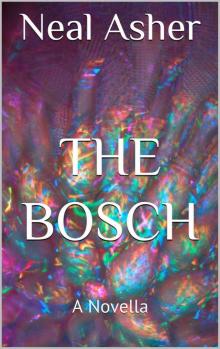 The Bosch: A Novella (Polity Universe)
The Bosch: A Novella (Polity Universe)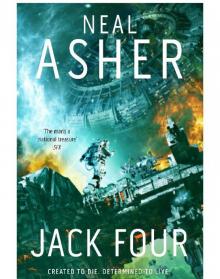 Jack Four
Jack Four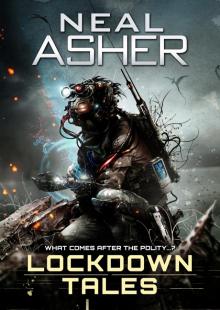 Lockdown Tales
Lockdown Tales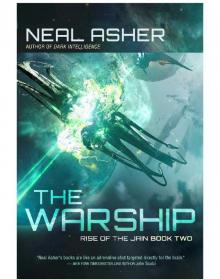 The Warship
The Warship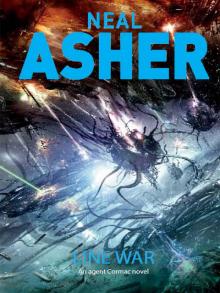 Line War
Line War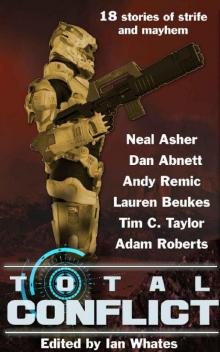 Total Conflict
Total Conflict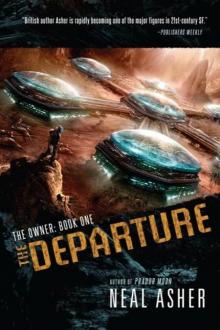 The Departure
The Departure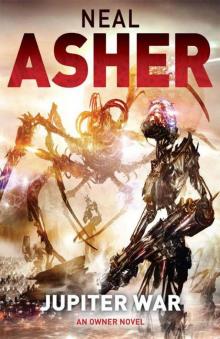 Owner 03 - Jupiter War
Owner 03 - Jupiter War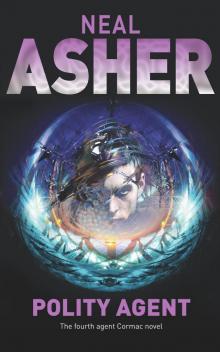 Polity Agent
Polity Agent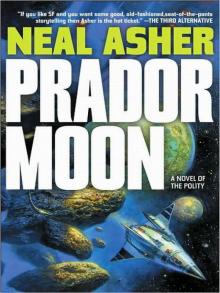 Prador Moon
Prador Moon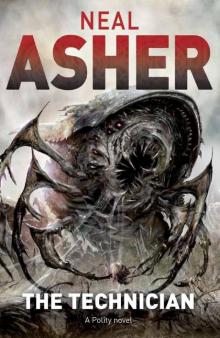 The Technician
The Technician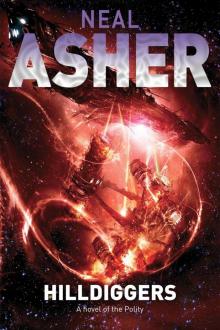 Hilldiggers
Hilldiggers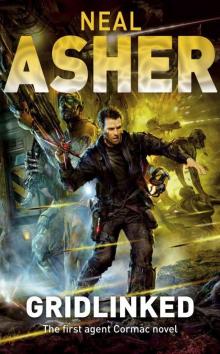 Gridlinked
Gridlinked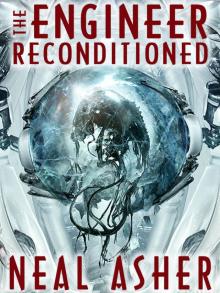 The Engineer ReConditioned
The Engineer ReConditioned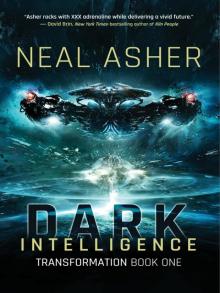 Dark Intelligence
Dark Intelligence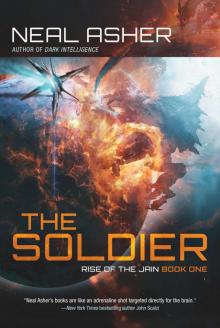 The Soldier: Rise of the Jain, Book One
The Soldier: Rise of the Jain, Book One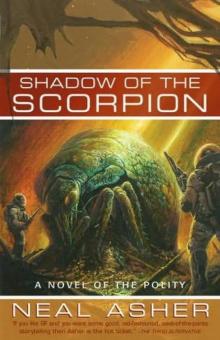 Shadow of the Scorpion p-2
Shadow of the Scorpion p-2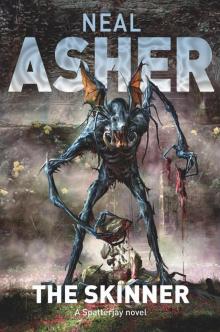 The Skinner
The Skinner The Soldier
The Soldier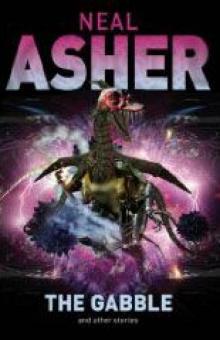 The Gabble p-13
The Gabble p-13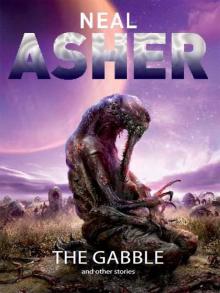 The Gabble and Other Stories
The Gabble and Other Stories The Parasite
The Parasite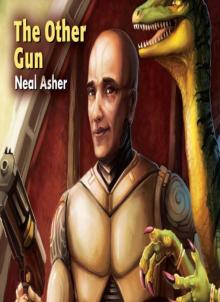 The Other Gun
The Other Gun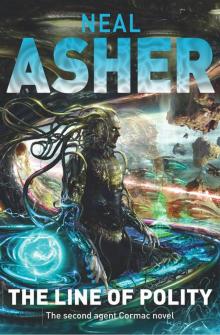 The Line of Polity
The Line of Polity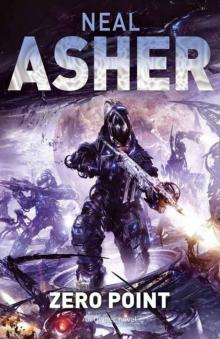 Zero Point (Owner Trilogy 2)
Zero Point (Owner Trilogy 2)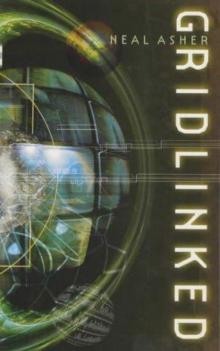 Gridlinked ac-1
Gridlinked ac-1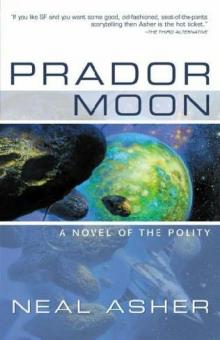 Prador Moon p-1
Prador Moon p-1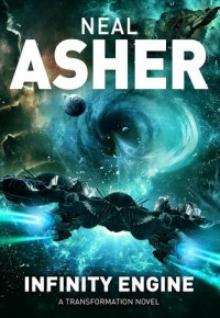 Infinity Engine
Infinity Engine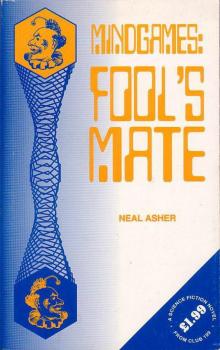 Mindgames: Fool's Mate
Mindgames: Fool's Mate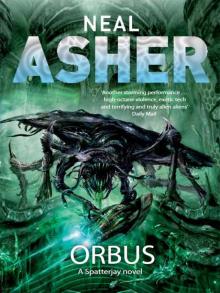 Orbus
Orbus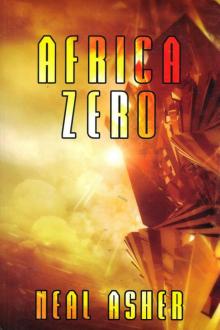 Africa Zero
Africa Zero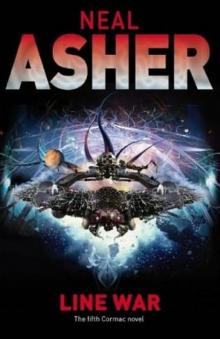 Line War ac-5
Line War ac-5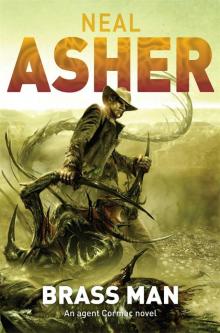 Brass Man
Brass Man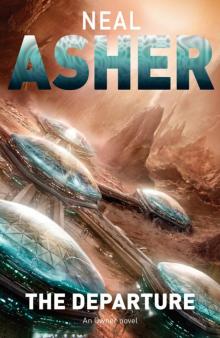 The Departure to-1
The Departure to-1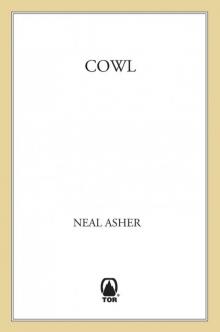 Cowl
Cowl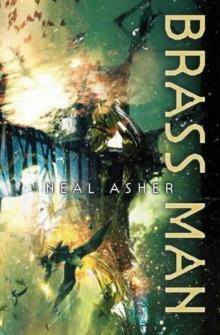 Brass Man ac-3
Brass Man ac-3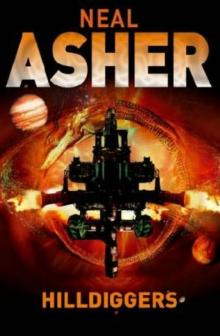 Hilldiggers (polity)
Hilldiggers (polity)![Greg Bear - [Eon Trilogy 1] - Eon (rescan) (v1.0) Read online](http://i1.bookreadfree.com/i2/04/08/greg_bear_-_eon_trilogy_1_-_eon_rescan_v1_0_preview.jpg) Greg Bear - [Eon Trilogy 1] - Eon (rescan) (v1.0)
Greg Bear - [Eon Trilogy 1] - Eon (rescan) (v1.0)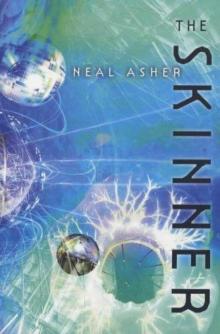 The Skinner s-1
The Skinner s-1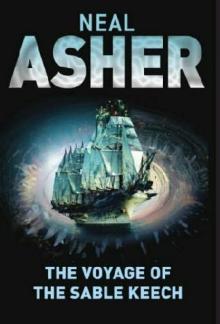 The Voyage of the Sable Keech s-2
The Voyage of the Sable Keech s-2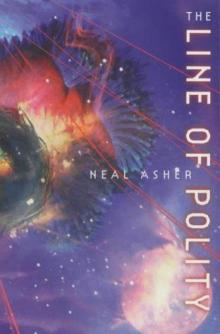 The Line of Polity ac-2
The Line of Polity ac-2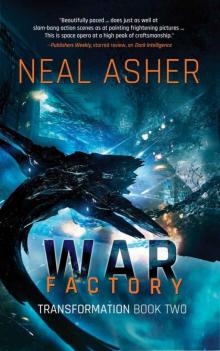 War Factory: Transformations Book Two
War Factory: Transformations Book Two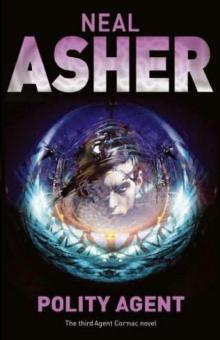 Polity Agent ac-4
Polity Agent ac-4